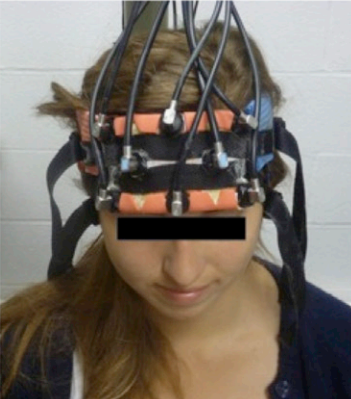Electrical brain stimulation helps people learn math faster
May 20, 2013

Testing the effects of transcranial random noise stimulation the prefrontal cortex. The orange plates are near-infrared spectroscopy devices, using infrared light to measure blood-flow changes. (Credit: Albert Snowball et al./Current Biology)
A harmless form of brain stimulation called transcranial random noise stimulation (TRNS) can help you learn math faster, researchers report.
“With just five days of cognitive training and noninvasive, painless brain stimulation, we were able to bring about long-lasting improvements in cognitive and brain functions,” says Roi Cohen Kadosh of the University of Oxford.
The enhancements to the speed of calculation- and memory-recall-based arithmetic learning held for a period of six months after training. No one knows exactly how TRNS works, but the researchers say the evidence suggests that it allows the brain to work more efficiently by making neurons fire more synchronously.
They applied the stimulation to the prefrontal cortex (DLPFC), a key area in arithmetic, and used near-infrared spectroscopy (NIRS) — using infrared light through the skull — to measure hemodynamic (blood flow) responses within the prefrontal cortex.
They tested two types of learning: drill learning 9ability to recall arithmetic
‘‘facts,’’ e.g., 4 x 8 = 32, from memory (rote learning) and calculation (manipulation of numbers according to set procedures or algorithms involving one or several mathematical operations (e.g., 32 — 17 + 5 = 20),
Kadosh and his colleagues had shown previously that another form of brain stimulation called transcranial direct current stimulation (tDCS) could make people better at learning and processing new numbers. But, he says, TRNS is even less perceptible to those receiving it (people get a slight tingling on the scalp with tDCS).
TRNS also has the potential to help more people because it can improve mental arithmetic — the ability to add, subtract, or multiply a string of numbers in your head, for example — not just new number learning. Mental arithmetic is a more complex and challenging task, which more than 20 percent of people struggle with.
It might also be of particular help to those suffering with neurodegenerative illness, stroke, or learning difficulties, the researchers suggest.